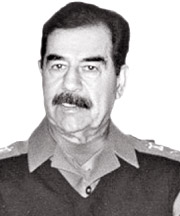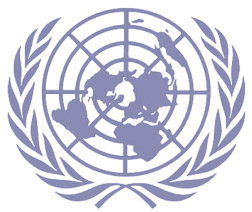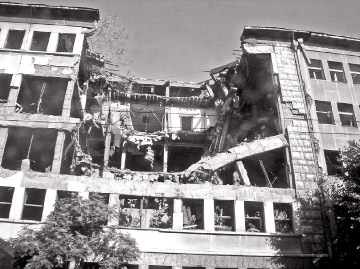|
Rights gone wrong - do human rights really exist? -
Part II :
WESTERN INTERFERENCE in the guise of HUMAN RIGHTS
Jinadasa BAMUNUARACHCHI
 |
|
Saddam
Hussein |
 In fact the human rights corpus, though well meaning, is a
Eurocentric construct meant for the reconstitution of non-Western
societies and peoples with a set of culturally biased norms and
practices. For instance values in a patriarchal society like ours have
no place in the Western value system which provided the ideological
basis for Universal declaration. In fact the human rights corpus, though well meaning, is a
Eurocentric construct meant for the reconstitution of non-Western
societies and peoples with a set of culturally biased norms and
practices. For instance values in a patriarchal society like ours have
no place in the Western value system which provided the ideological
basis for Universal declaration.
In the post-Cold War era, this Human Rights regime was nakedly used
on the pretext of resolving conflicts and prevents humanitarian
disasters around the world. In the 1990s, a series of military
interventions were carried out in the name of human rights. In 1999, the
first so-called ‘humanitarian war’ was carried out in the former
Yugoslavia by NATO forces without the formal approval of the UN.
The principle of non-intervention, the idea that states should
refrain from intervening in the affairs of other states, has long been
considered an important rule of international relations. The United
Nations Charter prohibits states from attacking other states. Only the
Security Council can authorise the use of force in order to protect
international peace and security.
Today virtually every cause seeks to cloak itself in the righteous
language of rights. But even so, this universal reliance on the rights
idiom has not succeeded in creating common ground and deep agreement as
to the scope, content, and philosophical bases for human rights. This is
because the current Human Right regime is heavily Eurocentric in nature
and has no correlation to the oldest cultures in the world.
The idea of a right to humanitarian intervention was pioneered in the
1960s by a group called French humanitarian organisation Médecins sans
Frontières (MSF). When there are human rights violations, MSF argued,
international actors have a right to intervene to stop them.
‘Humanitarian war’
The 1990s witnessed an unprecedented number of interventions
ostensibly carried out in defence of human rights.
Military interventions were justified on human rights grounds to
varying degrees in Iraq in 1990-1991, Somalia in 1991-1993, East Timor
and Sierra Leone in 1999, and the former Yugoslavia throughout the
1990s.
In 1999, NATO launched a six-week bombing campaign against Serbia.
Serbia’s alleged atrocities government forces said to have begun to
commit in the province of Kosovowas taken as a catastrophic situation
and a military intervention was designed to prevent what allies called a
humanitarian disaster - the forcible expulsion of Kosovo’s majority
Albanian community by Serb forces.
The first so-called ‘humanitarian war’ was controversial because it
was not sanctioned by a UN Security Council resolution as the Charter
mandates.
 |
|
Destruction
caused by the 1999 NATO bombing in Serbia |
This was because two permanent members of the Security Council,
Russia and China, were opposed to any intervention in Kosovo. They
argued that the Western powers were using human rights as an excuse to
interfere in the affairs of other countries.
NATO went ahead with the campaign without the UN sanction. Serbia
ultimately surrendered and Kosovo became independent.
The Kosovo case provided a most recent example of Balkanisation put
in place by the US led allies. Balkanisation is defined as the process
of fragmentation or division of a region or state into smaller regions
or states that are often hostile or non-cooperative with each other. The
division of regions and states is major item on the western political
agenda at the present time. R 2 P is being used to achieve this
political goal.
US President Bill Clinton and UK Prime Minister Tony Blair spoke of
the emergence a new world order where foreign policy decisions are
motivated by their own theory of R 2 P in the protection of human
rights.
By taking military action to protect one community, however, the
rights of another suffered. The NATO dropped 23,000 bombs on Serbia in
order to protect much cherished Human Rights. It is a clear case in
recent history that Human rights Regime was used to divide a country
against the will of its people. What a smack of hypocrisy.
Certainly the existence of human rights in this backdrop is a myth.
The regime is widely abused, for political and economic objectives.
Human Rights regime is currently being used as a political tool by
the America and its western allies. The extent, to which the use of
human rights has become a political tool in the hands of super powers,
can be discussed in relation to recent use of power to bring down
regimes in the Middle East by the USA and its allies.
Invasion of Iraq in March 2003, by coalition led by the U.S. and U.K.
provides a classic case in point. British Prime Minister Tony Blair
accused Saddam Hussein of possessing weapons of mass destruction and
having ties to Al-qaeda. This allegation is unproved even to this day.
However, on November 5, 2006, Saddam was convicted not for having WMD
but on charges related to violation of Human rights and killing of 148
Iraqi Shi’ites in 1982 and was sentenced to death by hanging. His
execution was carried out on 30 December 2006.
Is it justified to use violence to promote human rights in this
manner? Isn’t this clear smack of hypocrisy?
Is it only the West that can speak of Human Rights? What are
non-Westerners position vis-a-vis Human rights?
The world’s first Human Rights discourse was first made known and
gifted to the mankind by Gautama the Buddha in 6th century BC. This is a
fact unknown to the west. The Buddha preached a comprehensive and
complete way of life which is an embodiment of all or more rights at a
time Western man was in the jungle as a primitive creature. One does not
need to go on extensive study of Buddhism to find out this fundamental
truth. The ‘panchaseela’ or pansil (five precepts) the elementary
teaching would through the light on this question.
Five precepts
Most religions have moral and ethical rules and commandments.
Buddhism has precepts, but it’s important to understand that the
Buddhist precepts are not a list of rules to follow. In some religions,
moral laws are believed to have come from God, and breaking those laws
or transgression is going against God. But Buddhism doesn’t have a God,
and the precepts are not commandments. The five precepts (five virtues)
are commitments to abstain from harming living beings, stealing, sexual
misconduct, lying and intoxication. Undertaking the five precepts is
part of both lay Buddhist initiation and regular lay Buddhist devotional
practices.
Five precepts are not formulated as imperatives, but as training
rules that laypeople undertake voluntarily to facilitate practice.
The simple meaning of the first precept is that I abstain from
harming or killing any living being. What does this mean? This is
nothing but accepting the right to life which is not a Human Right as
declared in the Human rights charter or any other human rights discourse
promulgated by the west, but essentially a Fundamental right of all
living being. The Human Rights charter does not recognise the right to
life of non-human beings. This is one of the fundamental prerequisite
that is lacking in the Western Human Rights discourse. This is the
reason for daily slaughtering millions of animals for human consumption.
According to Western thinking and ideology slaughtering animals is
not a violation of animal rights, because they are not humans and hence
animals can be killed at will. If the western ideology accepts the right
to life as a fundamental right of all living being they cannot continue
with daily slaughtering of millions of animals for their decadent life
style.
Also to treat animals by clipping their beaks and claws, putting them
in vast clucking concentration camps, packed into cages so small they’re
unable to move, where they are drip-fed drugs to artificially enhance
their breasts, before being executed. So they have termed the phrase as
Human Rights to exclude the non-human beings that have a right to life.
The second precept means that I undertake to abstain from taking what
is not given (steal). This is the right to property or respecting the
right to retain ones property whether they are human or non-human being.
The third precept means that I undertake to abstain from sexual
misconduct. One could well comprehend relevancy and the propriety of the
third precept in relation to safety security and well being of the
institution of family in terms of one’s right to privacy and decent
livelihood without being infringed by others. This is the right to
dignity and freedom from sexual abuse. The scope of the fundamental
right in Buddhist doctoring is thus extended to cover the protection of
family life in society.
Fourth precept is means that I undertake to abstain from lying or
false speech.
This has become one of the most important fundamental rights in the
current political scenario especially in relation to the conduct of
national and international media.
Buddhist teachings
This is the right to know the truth or not be lied to. Everyone has a
right to information, it’s not mere loading information designed to
mislead people for sinister purposes or to manipulate with the objective
of covering truth in order to achieve desired results. Everyone has the
tight to know the facts and truth however unpalatable it is. That is the
importance and the bearing of the fourth precept in private or public
life where everyone speaks the truth and nothing but the truth.
The last of the five precepts is not meant as a right but as a rule
of discipline that help protect safety security and well being of the
man kind.
The meaning of this precept is that I undertake to abstain from
taking intoxicants or from fermented drink that causes heedlessness.
A direct application of these five precepts yields, a right to life,
a right not to have one’s property stolen, a right to fidelity in
marriage, and a right not to be lied to. Many other human rights, such
as the rights to liberty and security can either be deduced from or are
extant within the general corpus of Buddhist moral teachings. A right
not to be held in slavery, for example, is implicit in the canonical
prohibition on trade in living beings.
These rights are the extrapolation of what is due under Dharma; they
have not been “imported” into Buddhism but were implicitly present.
According to western thinking Rights are natural and natural rights
have come from the creator. Buddhism does not accept a creator and no
one has given rights to humanity. Buddhism accepts the natural rights
that are necessarily relates to the Fundamental Laws of the Nature.
Therefore humans have to co-exist with the nature and it is this bit
that is not found in the Western thinking.
Buddhism, more than any other religion, places a high emphasis on
freedom of thought and freedom of expression in terms of its doctrinal
ethics clearly articulated in the discourses of the Buddha.
The fundamental Buddhist doctrinal positions on freedom of thought,
freedom of expression and intellectual debate are clearly represented in
the Dharma. The Buddha taking an unprecedented move attacked the cast
system of India and raised the status of the woman by establishing the
Bikkuni order.
Western writers who study Indian thought in most cases have either
misunderstood or misinterpreted socio-political conditions prevalent at
the time. They prefer to use the word despotism which does not provide
the true position in relation to the socio-cultural relations that
existed in the contemporary society. This usage has created the
impression in the English reader’s mind that in Asian lands it was a
case of despotic monarchs tyrannising over a helpless people. The type
of oppression of the peasant by the lord as was witnessed in Europe
before the French Revolution was never seen within the boundaries of
Buddhist India or Sri Lanka.
The Western man is trying to define our social relations in terms of
his knowledge in relation to the evolution of European political
thought. This is absolutely without any basis and based on the wrong
premise and belief.
Human Rights violations
If one looks at the Sri Lankan case, and what’s happening in the
international arena in relation to the country’s alleged Human Rights
violations, one could foresee the events to follow. Methods likes use of
economic sanctions and embargoes would not apply on the same scale in
our case as there is an obvious contrast with the conditions that
prevailed either in Iraq or Egypt. Human Rights crusaders are well aware
that overt and covert operation to bring in Arab style spring will not
succeed as it could turn in to an Arab winter in our country. Human
Rights crusaders may be having an overall assessment of the ground
situation and associated issues concerning the Sri Lankan case.
The modus operandi of bring the accountability issue before the Human
Rights council and pursing this issue for several years more is
undoubtedly form part of a long-term strategy aimed at regime change.
This is indicative of the US move to bring a “procedural” resolution as
a follow up to the UNHRC in March 2012. How long will the follow up to
go on? Where is the end to this follow up? Who does the so called
dispassionate investigation? Why such a bleak picture of Sri Lanka is
being painted at Human Rights Commission based on unproved allegations?
When will the US and its allies take their hands off Sri Lanka honouring
the country’s sovereignty?
Sri Lanka as a country has suffered a lot and bled profusely on
account of terrorism. It is now being taken to task for crushing
terrorism. Isn’t this an attempt to get the country probed under
Genocide Convention? Aren’t they presenting Sri Lanka’s victory of
crushing terrorism as violation of Human rights? Hasn’t Sri Lanka got
the right to protect its sovereignty from those who challenge it? Will
USA and its western allies ready to give a part of their respective
countries to Al-qaeda? Aren’t they aware that LTTE was the blood
brothers of Al-qaeda? Will this not stop until the US and its allies
achieve their political objective of establishing hegemony in the region
in the name of Human rights?
Any objective analysis of Sri Lanka’s political landscape during the
post-war period will suggest that our country does not stand lower than
other countries in terms of human rights; and it is a fact that there
are no probes against those countries where basics of human rights are
not observed. Before I conclude I wish to point out the true nature of
western hypocrisy with one example.
The President of the European Court of Human Rights, Sir Nicolas
Bratza warned Western political leaders against using “emotion and
exaggeration” to criticise the court’s workings. He made his comments as
he released figures detailing the court’s rulings during 2011. The
figures revealed that the court ruled against the UK on eight occasions.
Political tool
British Prime Minister David Cameron who was annoyed with ECHR once
called upon in the House of Commons for reform of the court, saying the
volume of cases and the triviality of some meant it was in danger of
becoming a “small claims court”. Such was his attitude toward the Court
ruling against UK.
Finally it must be emphasised that a human right by definition is a
universal moral right, something which all men women and children
everywhere, at all times ought to have, but being misused as a political
tool for regime change by those who have the means and might to do so.
Our country is in grave peril of being coerced. The road ahead of us is
a tortuous path to tread on. We need to close ranks and design a well
thought out effective foreign policy orientation to cope up with the
situation.
The present Human Rights regime emanating from the West is
necessarily Eurocentric based on Judeo-Christian morality and hence
lacks universality (applicable everywhere). The regime is also not
egalitarian (same for everyone).
And has been used as coercive political tool for proliferation of
superpower hegemony, if it was to succeed, it must move away from Euro
centrism as a civilizing crusade and attack on non-European peoples.
Only a genuine approach to human rights can make it truly universal.
Indigenous, non-European traditions of Asia, Africa, the Pacific, and
the Latin Americas must be deployed to deconstruct - and to reconstruct
- a universal bundle of rights that all human societies can claim as
theirs.
[email protected]
Concluded
|







